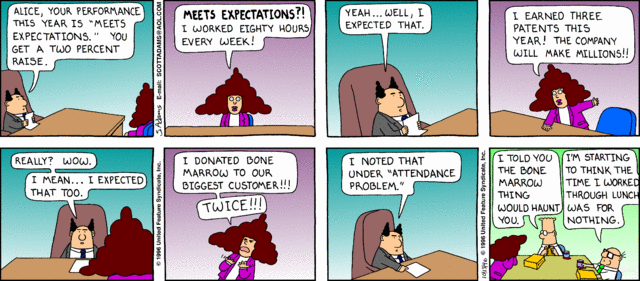Annoying Ranking
It is always a difficult job when I need assess teammember’s annual work perfomance. Especially you have to say who is the best, who is runner-up … It’s already a public hidden rules that we all know there’s trick in this kind of evaluation.
In order to make it at least a little meaningful, my solution was never compair between members, just compair to each one’s own resolution and goal. Howerver, to make this judgement reliable, there’s tremendous work everyweek, I need to document and review everyone’s work regularly. But even the judgement is convincing, we still can’t announce everyone is beyond expectation! Cause quota is limitted, we have only 1 or 2 places.

In this artical UNJUST DESERTS, The author Karl Wiegers’s idea is get rid of this stupid ranking system.
Individual Success??
A job well done deserves a proper reward, right? But in collaborative efforts such as agile development, can you single out individual efforts without killing the team’s morale and productivity? When it comes time to divvy up the pie, can justice ever be served? Or will your team members be left with unjust deserts?
Ranking Disfunction
Disfunction #1 : Competition
Ranking people for merit raises pits individual employees against each other and strongly discourages collaboration.
Disfunction #2 : The Perception of Unfairness
It doesn’t matter if the system is fair or not. If there is a perception of unfairness, then those who think that they have been treated unfairly will rapidly lose their motivation.
Disfunction #3 : The Perception of Impossibility
When people find management exhorting them to do what is clearly impossible rather than helping to make the task possible, they are likely be insulted by the offer of a reward and give up without even trying.
Disfunction #4 :Sub-Optimization
When we optimize a part of a chain, we invariably sub-optimize overall performance.
Disfunction #5 : Destroying Intrinsic Motivation
Once employees get used to receiving financial rewards for meeting goals, they begin to work for the rewards, not the intrinsic motivation that comes from doing a good job and helping their company be successful.
Solution Guideline
Guideline #1 : Make Sure the Promotion System is Unassailable
Replace merit pay system with promotions system. Promotion system is a series of job grades, each with a salary range in line with industry standards and regional averages. People must be placed correctly in a grade so that their skills and responsibilities match the job requirements of their level. Job grade and title should be public information and promotion criteria should be clear and unclassified. A management committee will review each promotion proposal.
In order to discourage people all moving into management for high salary. Company can use “Dual Ladders” that offer management-level pay scales to technical gurus.
Guideline #2 : Deemphasize the Merit Pay System
When information sharing and coordination are necessary, organizations that reduce pay differences between the highest- and the lowest-paid employees trend to perform better over time.
Over the last decade, balanced scorecards have become popular for management evaluations - at least in theory. But It is important that employees perceive that the input to the scorecard is valid and fairly covers the multiple aspects of their job.
Guideline #3 : Tie Profit Sharing to Economic Drivers
Avoid sub-optimization by tying differential pay system as closely to the economic driver of its business as possible.
Guideline #4 : Reward Based on Span of Influence, Not Span of Control
Evaluating individual results, rather than group results, creates competition rather than collaboration among the team members. If a software program creates a significant profit increase, everyone, including those who brought the idea into the company, the developers and testers, the operations and support people, and the end-users, should share in any reward.
How, exactly, can rewards be based on span of influence rather than span of control? I recommend a technique called “Measure UP”. NO matter how hard you try to evaluate knowledge work or how good a scorecard you create, something will go unmeasured. Over time, the unmeasured are will be de-emphasized, and problems will arise. We have a tendency to add more measurements to the scorecard to draw attention to the neglected areas. However, it is a lot easier to catch everything that falls between the cracks by reducing the number of measurements and raising them to a higher level. For instance, instead of measuring software development with cost, schedule, and earned value, try creating a P&L or ROI for the project and helping the team use these tools to drive tradeoff decisions.
Guideline #5 : Find better motivators than Money
Treat monetary rewards like explosives because they will have a powerful impact whether you intend it or not. Make sure people are fairly and adequately compensated, and then move on to more effective ways to improve performance.